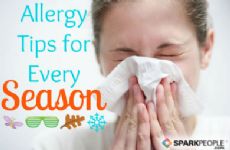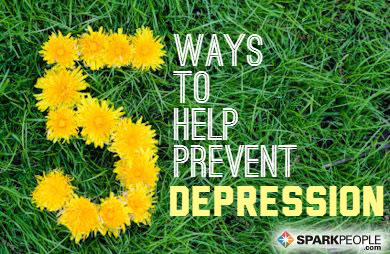|
Just as you've gotten your summer routine down, finally learning to embrace those sweaty, warm-weather workouts and balmy evening walks—bam! Fall has blustered onto the scene, complete with its Insta-worthy foliage, cool nights and comfortable days, pumpkin-flavored everything… …and sneezing, runny noses and itchy, watery eyes. Unfortunately, autumn tends to arrive with a host of allergens that threaten to trigger a range of symptoms, from annoying to downright miserable. According to Chirag Shah, M.D., board-certified emergency medicine physician and co-founder of Accesa Labs, one of the biggest culprits is ragweed pollen. "Ragweed is a common weed that releases lots of pollen in the fall," he explains. "Many people are allergic to ragweed pollen, resulting in an increase in allergy symptoms with the change in seasons." And because ragweed pollen is airborne, fall's increased winds and rainfall can send it traveling for hundreds of miles. Another big fall allergy offender is mold. "Mold loves the shrinking amounts of daylight and piles of wet, fallen leaves brought on by the changing seasons," Dr. Shah explains. "The growth in mold leads to increased amounts of mold spores, which can cause allergies in susceptible people." And on top of all that, fall is prime season for the cold, flu and other viruses, which can make allergy symptoms even worse. But that doesn't mean you have to let allergies ruin your autumn. Allergist Bradley Chipps, MD, president of the American College of Allergy, Asthma and Immunology, points out that if people prepare in advance, they won’t get hit quite as hard when the allergens descend with full force. Technically, the fall allergy season begins at the end of August and lasts until the first frost of the year, as late as November. By adopting some of these anti-allergy habits, you can help keep symptoms at bay so you can enjoy all of those hayrides and hot chocolates with clear eyes and sinuses. Know your allergies. For many people who experience allergy symptoms, identifying the cause is a guessing game. To pinpoint the culprit, Dr. Tania Elliott, MD FAAAAI, FACAAI, says to think about the timing of your symptoms and how long they are lasting. Ask yourself: Does it happen at the same time every year? Does it occur more when you are indoors or outdoors? Does it last into the winter? "From there, meet with an allergist who can help you determine what it is that you are allergic to, a process that involves both your history of symptoms and allergen-specific tests, either in the skin or the blood," Dr. Elliott recommends. Know your meds. Once you've identified what's triggering your allergy symptoms, and if those symptoms only occur once in a while and are relatively mild, Dr. Elliott says a non-sedating, over-the-counter (OTC) antihistamine, such as such as cetirizine, should help reduce their severity. Nasal steroid sprays are the first line of treatment for people with allergies, Dr. Elliott says. They work by decreasing inflammation in the nasal passages and blocking the chemicals that cause itching, redness, swelling, congestion and post-nasal drip. They won’t provide immediate relief, but they will help if used regularly, she notes. "Remember, not all nasal sprays are created equally," warns Dr. Elliott. "Steer clear of those that contain decongestants, as these shouldn’t be used for more than a few days at a time." Because fall allergies may start earlier and last longer, Dr. Chipps notes that it’s important to begin taking your allergy medications at least two weeks before your symptoms normally start, and to keep taking them until pollen counts have been down for about two weeks, usually after the first frost. Don't take the lungs lightly. Aside from the ordinary annoyances of runny noses and itchy, watery eyes, some people experience respiratory problems as a result of fall allergies. Dr. Purvi Parikh, allergist and immunologist with Allergy & Asthma Network, warns that these reactions could be dangerous if left untreated. "Any cough that persists even after you have tried a nasal spray and antihistamine or shortness of breath, wheezing or chest tightness are all signs of allergic asthma—even if you have never had asthma before," she says. In this case, Dr. Parikh strongly recommends seeing a board-certified allergist or pulmonologist, as you will likely need an inhaler. Keep moisture under control. Mold thrives in the fall, as the leaves fall and form moist piles outdoors. Dr. Chipps points out that in addition to leaves, mold can be found anywhere there is water, including in your backyard, in a field of uncut grass and in clogged gutters. "If you are allergic to mold, the key to reducing it is moisture control," he says. "Be sure to clean standing water anywhere you find it. You can also help ward off mold by cleaning gutters regularly and keeping your home's humidity below 60 percent." Have "outside clothes" and "inside clothes." Inevitably, pollen and spores will stick to your clothing throughout your day, warns Dr. Shah. When you get home, leave your shoes outside the house, put the clothes you were wearing into the washer (with hot water to rid laundry of dust mites) and change into new clothes, so that any pollen and spores that hitched a ride don't get spread around your home. Dr. Chipps also recommends showering and washing your hair in the evening before bed, so you’re not sleeping with pollen and getting it on your pillow and into your nose. Do some anti-allergy housekeeping. If you’re already indoors, the best way to keep outdoor allergens out is to close off their path to your home, says Christopher Dietz, D.O. with MedExpress. Keep the doors closed and the windows shut (in the house and car). "All it takes is for a breeze to sweep in some fresh ragweed spores, and you’ll be feeling the effects of fall allergies," he warns. Dietz also cautions that common household furnishings—such as thick carpeting, pillows or counters and shelves filled with knick-knacks—can attract and hold allergens and dust, which can trigger fall allergies. "Consider replacing carpeting with non-toxic hardwood floors, putting allergy-approved cases on your pillows and reducing dust-collecting items in the home," he suggests. Wash your nose. Just as we need to wash our hands frequently and thoroughly to get rid of any bacteria, dirt or viruses, people with allergies need to regularly cleanse their nasal passages to flush out those allergens, notes Dr. Elliott. "The longer the allergen sits in the nose, the worse your symptoms are going to be," she warns. Some common nasal cleaning methods include using a saline spray or a neti pot. Get your vaccinations. Dr. Purvi Parikh, an allergist/immunologist with the Allergy & Asthma Network, stresses the importance of getting a flu shot, and for those who have asthma or are over the age of 65, a pneumonia shot as well. "Although infections are not allergies, those with allergies are at a higher risk of getting sick, and you will feel twice as bad if you are dealing with both allergies and viruses at the same time," notes Dr. Parikh. Dr. Elliott points out that there is a way to "cure people" of their fall allergies with something called allergen immunotherapy, or allergy shots. With this treatment, the allergist gives you small injections of what you are allergic to and builds up the dosage over time. "This 'teaches' your body to no longer be allergic to the pollen and allows you to build up a tolerance to it," she explains. "If done correctly, there is a 75 percent cure rate. It also prevents you from developing other allergies down the line." Try an air filter or air purifier. Studies have shown that an air filter or air cleaner could help to alleviate fall allergy symptoms, when used in tandem with other strategies to minimize exposure to allergens. According to WebMD, both the U.S. Environmental Protection Agency (EPA) and the American Lung Association recommend air filtration for people who struggle with allergies and asthma even after making other changes to their environment. It's also important to clean all air filters, duct filters and air conditioner filters at least once each season. By taking some smart precautions before symptoms set in, you can appreciate the outdoor beauty of the autumn season—and actually taste the flavor of your pumpkin latte—without the annoyances of a stuffy or runny nose and itchy, watery eyes. |
More From SparkPeople
|





















